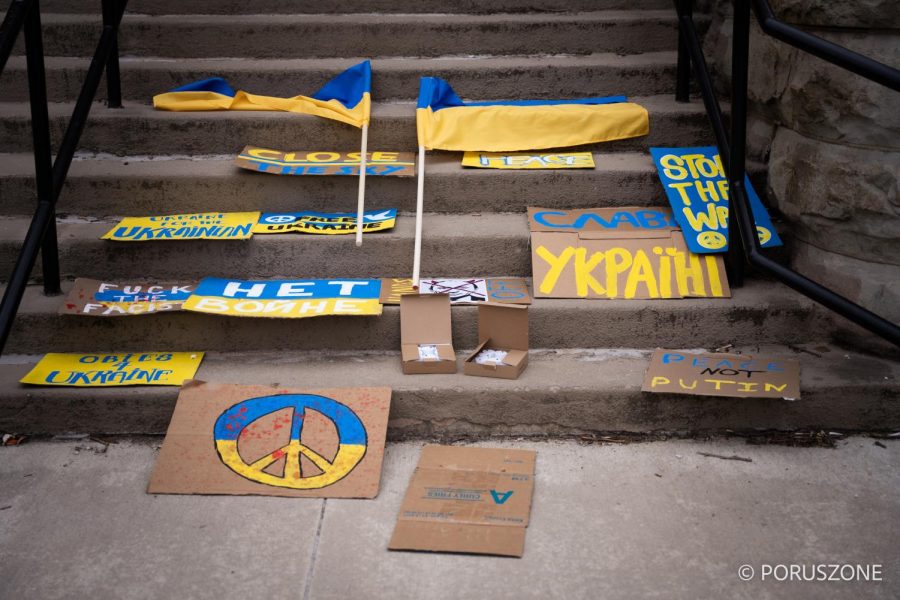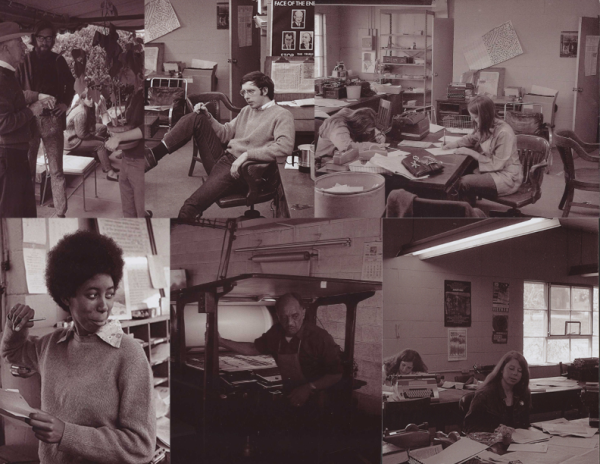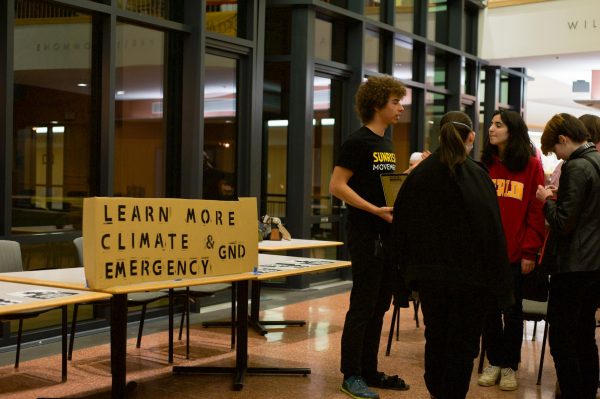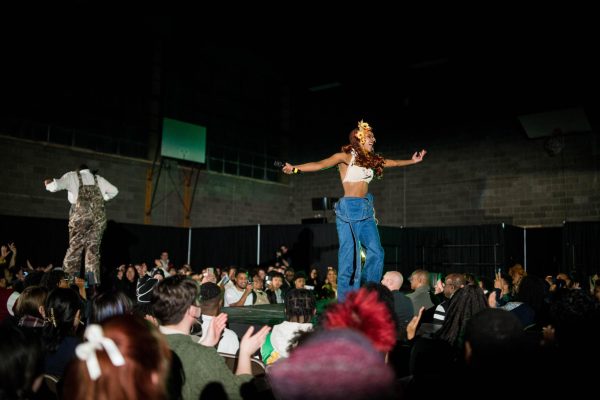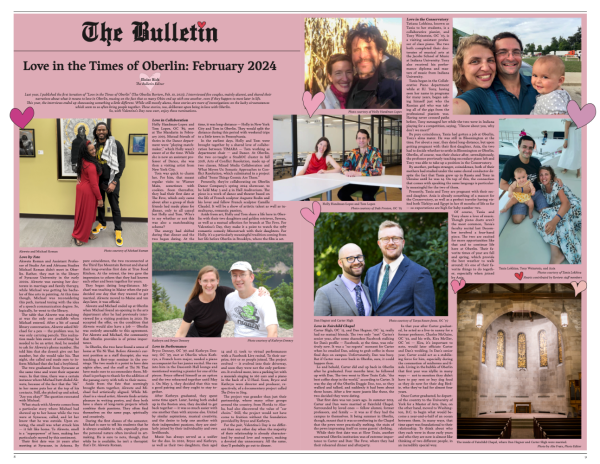Eastern European Students Call On Peers to Take Action in Ukraine Crisis
It has been one year since Russia began its invasion of Ukraine. The world was faced with daily breaking news headlines giving us a clinical overview of the violence happening in Ukraine. Now, however, the frequency of headlines has decreased and the news tends to focus on major cities like Kyiv or Odesa, with infrequent direct coverage of the lives of Ukrainian citizens and those in surrounding Eastern European countries.
Perhaps it is difficult to conceptualize that the war is still directly impacting the lives of Oberlin students, like College first-year Anya Molodtsova, an international student from Kyiv who has only been in the U.S. since the beginning of this academic year.
“It’s surprising how many people think [the war] is over,” Molodtsova said. “I wasn’t in the States, so it’s hard for me to get the right scope, but I feel like, overall … Ukraine took a much bigger part in [the] news post-invasion, obviously because it was a huge shock for the whole world. … It’s really sad because the scale of the problems didn’t decrease.”
When College fourth-year Andreea Procopan, an international student from Moldova, would introduce herself and where she was from, she would be met with questions about the war. She noted that this phenomenon fizzled out as time progressed, and her nationality was rarely referenced when she was in the U.S. Procopan believes that as long as the war is no longer breaking news covered by major news outlets, awareness of the war in the U.S. substantially decreases.
“I’m from a neighboring country that has a similar history in terms of Soviet occupation, [so] maybe that makes it easier for me to empathize with what’s going on [in Ukraine], but it shouldn’t be just that,” Procopan said.
Similarly, Molodtsova is conscious of the fact that if there is a reflection of a major event in Ukraine, like a missile attack, conversations are scarce due to a belief that the war will continue regardless of media coverage, as it was plentiful during the spring.
The past year, in total, has been marked by violence that has led to the loss of lives and the destruction of entire cities and communities. Despite these events continuing, conversations of the war have greatly dwindled.
However, ensuring that attention remains focused on the war is a primary tool to secure a quicker victory for Ukraine.
Procopan has been working alongside Molodtsova and College first-year Katia Chapin, a member of the tight-knit Ukrainian-American community, to organize a vigil and rally commemorating one year of the war in Ukraine today, Feb. 24, at 6 p.m. outside of Wilder Hall.
“I really want [the vigil] to be a space for people who are personally affected by the war and who feel like having a vigil or a public event will help them ease that pain or feelings that may have built up inside,” Procopan said. “That’s on one side, and on the other side, I’d like for Obies to remember that this is still happening and there’s so much pain and conflict in the world right now.”
Last spring, Procopan organized a protest in Oberlin of the war, and Molodtsova and Chapin both have a range of experience in organizing similar events. For Molodtsova, the bulk of her advocacy work was organizing rallies and demonstrations over the summer in Germany, before she arrived in the U.S. Chapin, on the other hand, worked on the U.S. front, organizing a rally in New York as well as doing advocacy work with Razom for Ukraine, a humanitarian relief organization she has been affiliated with for much of her life due to her mother’s involvement since its founding in 2014.
“I started with setting up cheese plates at events, and then, as I became more familiar with the organization … the odds and ends I did turned into actual projects,” Chapin said. “Now, the most consistent thing I do is … make a weekly news round-up from Ukrainian news sources for a couple of congressional offices that have asked for it. Since we’re not corporate lobbyists, we mostly provide information about Ukraine that, a lot of the time, offices can’t get.”
However, immense involvement with war efforts and organization of protests or vigils isn’t Procopan’s, Molodtsova’s, or Chapin’s expectation for every Oberlin student.
“I understand that the major reason I spend time organizing is because the story’s really close to me,” Molodtsova said. “I don’t expect every Oberlin student to go around organizing rallies, because the story’s not as close to them, but I would picture, in my perfect world, students sharing more information about Ukraine [and] raising awareness so more people will know about the problem and, potentially, more people will be able to help.”
One of the ways Procopan feels she is making a difference is through direct donations to non-governmental organizations like Razom or UNICEF, which will both be present at the vigil at a donation table.
“If you get Slow Train coffee once a week, then maybe you can sacrifice some of that for donating [to] something that could help kids impacted by the war,” Procopan said. “I think just checking in with people that I know who are really going through it, in terms of what’s going on, helps me. It’s really easy to feel powerless, but cumulative effect is a thing where each of us doing something small can really help.”
Humanitarian aid organizations can provide important resources, such as lifesaving tourniquets and first-aid kits, for the price of only thirty dollars, an amount easily spent weekly by many students.
“I think an important aspect to think about is your position in life and where you are as a person,” Molodtsova said. “I think the majority of students that go here, and not only here, are privileged, as well as I am — we have access to education, we can study, we can live peacefully and not [wake] up to the sounds of explosions, we can go to classes and not experience constant blackouts that restrict access to education.”
Importantly, there are other ways for individuals to fight the war outside of making donations or organizing. For Chapin, an important emphasis is the decolonization of departments across academia.
“It’s important to reexamine, even just within Oberlin, how classes about Russia and how classes about Eastern Europe are taught,” Chapin said. “Here, we have such a strong, progressive culture where we want to be at the forefront of change within academia, and we haven’t yet decolonized our Russian department. It does take a long time, but [we should come] into these classes and [understand] that Russian imperialism is real and very much alive, even to this day, and [move] forward with an attitude where people want to change that.”
Now as much as ever, it’s imperative to remember not only that the war is still happening, but also that there is a vast array of things students can do to help.
“You can go and fight on the actual front, but that’s only one out of so many fronts,” Chapin said. “People fight the war on the informational front, combatting disinformation and misinformation, and people fight the war on the academic front. There’s even a cyber front, where people will try to hack into Russian news broadcasting [networks] and broadcast the truth about the war, or there’s a meme front, called NAFO, the North Atlantic Fellow Association, [where] they use Shiba Inu memes and just spam Russian bot accounts. There’s a gradient, so everyone has their own front, and it’s just a matter of finding out what it is or which ones are your fronts to fight on. … Fighting little battles has a lot of impact in the long run, and, in general, contributes to Ukrainian victory.”
Resources:


